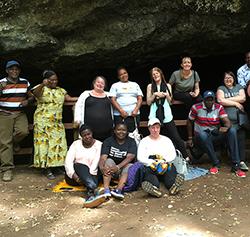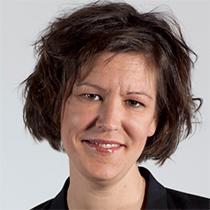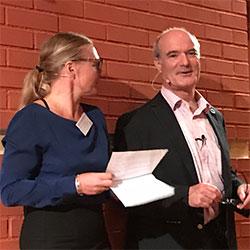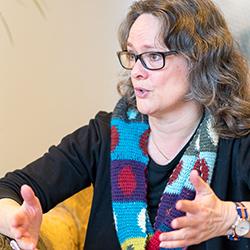International Women’s Day 8th of March is a reminder that while progress has been made towards gender equality and women’s empowerment, there is still work to be done. The higher education sector is no exception. To bridge the gender gap and foster equality in research it is crucial hear from diverse female voices, understand their experiences, acknowledge the challenges that women face in academic environments, and highlight their successes.
Throughout history women have fought for the right to an equal education both in terms of access to, security throughout and support in the completion of their studies. Beyond graduation women still face discrimination in their treatment in the workplace and difficulties throughout their career choices. There are still great barriers that discourage women from entering the academic profession and obstacles continue to block progress for those already in the field. This ultimately affects who gets to conduct research, on what, in what way and under what conditions. Although pattern varies between different fields of research and across geographical contexts, the ways of assessing achievement is based on institutional bias that put too much emphasis on publications, citations and research grants and thereby undervalues teaching, administration and outreach work. As a consequence, women are underrepresented, accounting for only around 30% of the global research pool (1). There is a disconcerting ‘leaky pipeline’ when it comes to women in research. Even though women are actively pursuing bachelor and masters degrees and even outnumber men at these levels, the higher the level in the academic hierarchy, the fewer the women.
Important to bear in mind in this debate, is that women are not a homogenous group and therefore experiences, needs and interest vary. Academia is not just an environment that is gendered, but also a place that discriminates based on intersections of race, class, ethnicity, sexuality, age, and functionality amongst others – causing a certain matrix of domination that echoes the particularities of a given time and place. An intersectional approach is thus crucial to understand people’s opportunities and agency in academia. To try to understand one single power structure in isolation from other power structures mask the complexity of reality. As the feminist writer and independent scholar Sara Ahmed states “To proceed as if the categories do not matter because they should not the matter would be to fail to show how the categories continue to ground social existence” (2) . In other words, to ignore how power structures based on social categories mutually construct one another is to normalize and make invisible whiteness, masculinity, heterosexuality, and ‘able’ bodies, among other hegemonic systems.
In order to realise just cities and sustainability in research we must also realise gender parity in the workplace so that all voices are heard. Research shows that a diverse working environment expands the pool of talented researchers, bringing in fresh perspectives, excellence and creativity. Universities have an important role to play and a responsibility to address structural issues as well as developing progressive frameworks that work promotes change towards more equal and inclusive universities and academic careers. A framework that acknowledge existing inequalities between men and women, but also against other types of inequalities, since gender and other power structures are always connected.
Chalmers University of Technology’s Gender Initiative for Excellence
Within ten years, Chalmers hope to increase the proportion of women at the professor level from 17 percent to 40 percent and remove structural and cultural obstacles that hamper career progression of women. Chalmers aims to create a working environment that is diverse and inclusive and supportive of excellence in research and teaching. The university invests 300 million SEK over ten years on gender equality work to make Chalmers more successful. For more information see Chalmers website.
Highlighting women in sustainability research
Women are despite resistance changing the world in academia and practice. Within this complexity, women throughout the globe have and continue to inspire and do breakthroughs in research. To celebrate International Women’s Day, I asked Mistra Urban Futures staff to reflect on women that inspire them in their work. Below are some of the women that they are inspired by:
Elinor Ostrom
Elinor Ostrom was an American political economist who was told she could become a secretary, instead she became Nobel Prize winner in Economics 2009. She challenged the conventional wisdom by demonstrating how local property can be successfully managed by local commons without any regulation by central authorities or privatization.
Sheila Jasanoff
Sheila Jasanoff is Pforzheimer Professor of Science and Technology Studies at the Harvard Kennedy School. Her work explores the role of science and technology in the law, politics, and policy of modern democracies. Her theoretical work demonstrates wider thesis around co-production of science and society.
Xuemei Bai
Xuemei Bai is a Professor of Urban Environment and Human Ecology at the Australian National University. Her research focuses on several frontiers of urban sustainability science and policy.
Line Gordon
Line Gordon is the Director of the Stockholm Resilience Centre. She is an internationally recognised scientist in sustainability of water, food, and the biosphere. She conducts innovative research that combines work with small scale farmers in Africa, global models of land-use and rainfall interactions, and culinary innovators. Line is an expert in the food system, one of the most important areas for our future.
Silvia Federici
Silvia Federici is a feminist writer, teacher and activist. In 1972, she co-founded the International Feminist Collective, which launched the Wages for Housework campaign. She has been instrumental in developing the concept of ‘reproduction’ as key to class relations, and central to forms of autonomy and the commons. Federici is celebrated for her decades of research and political organising, is active in anti-globalisation movements, the US anti-death penalty movement, and student and teacher struggles against the structural adjustment of African economies and educational systems.
Barbara Czarniawska
Barbara Czarniawska is a senior Professor of Management Studies at Gothenburg Research Institute, School of Business, Economics and Law at University of Gothenburg, Sweden. She takes a feminist and processual perspective on organizing.
Highlighting female colleagues
“I'd like to nominate Professor Beth Perry. Beth inspires me because - in a culture where women academics with small children are expected to perform in line with men despite significant structural inequality - and despite an intense and exciting research life of her own (and her own family responsibilities), this is a woman who invests careful thought and significant time and energy into making academic life possible for early career researchers including those with young children.” - Sophie King, Research Fellow, Sheffield-Manchester platform
“I would highlight women researchers who have written under collective pseudonyms to highlight political struggles of working within neoliberalising universities: e.g. Emma Sharp, who offered me so much care and patience as journal editor during the arduous writing of my first paper, and Marit Rosol and colleagues.” - Charlotte Spring, Research Associate, Sheffield-Manschester platform
“I am inspired by a wonderfully diverse, powerful cohort of female research colleagues at African Centre for Cities who collectively represent both the global experts and the next generation of urban voices and scholars so I am just going to list them here: Rike Sitas, Sylvia Croese, Mercy Luthango-Brown, Jane Battersby, Alicia Fortuin, Laura Wenz-Nkula, Alison Pulker, Sophie Oldfield , Anna Selmeczi , Liza Cirolia , Ntombini Marrengane, Caroline Skinner, Vanessa Wason, Amy Weimann, Nobu Ngwenya and Sue Parnell.” - Alma Viviers, Communcations Officer, African Centre for Cities (ACC is one of Mistra Urban Futures partners and the host of the Cape Town Platform).
“I would like to nominate all of my female colleagues at African Centre for Cities who inspire me through their research, writing, teaching, student supervision, their generosity as colleagues and who are also loving mothers and/or partners at home!” – Sylvia Croese, Researcher, Cape Town platform
A big source of inspiration for me is Merritt Polk, at the University of Gothenburg! She has the ability to make complex things simple.” - Henrietta Palmer, Deputy Scientific Director, Mistra Urban Futures
“For me, Henrietta Palmer, Deputy Scientific Director, Mistra Urban Futures is a big inspiration, not just for her wisdom and experience but for the way she acknowledges and encourages her colleagues and the people around her for their achievements. A big thank you for being an inspiration!” - Jenny Sjödin, Communications Manager, Mistra Urban Futures.
References
(1) UNESCO’s Science Report Towards 2030
(2) Ahmed, Sara. (2012) On being included: racism and diversity in institutional life (p.182). Durham, N.C: Duke University Press.
Photo by Charlie Foster on Unsplash








